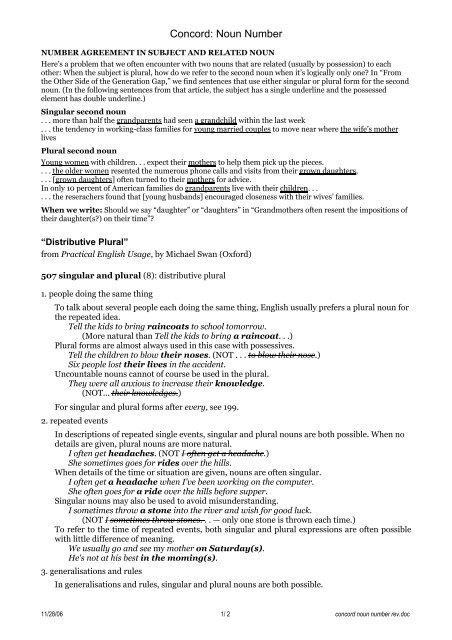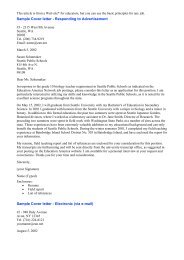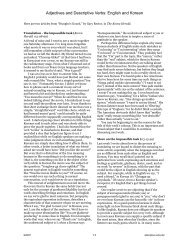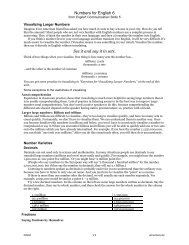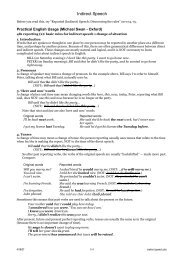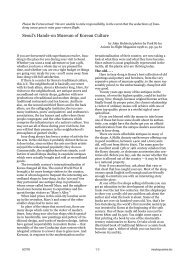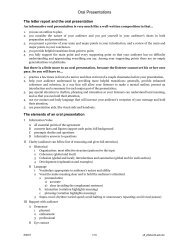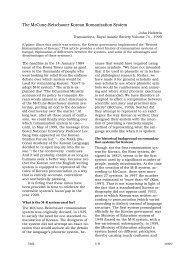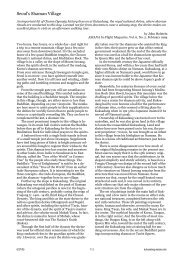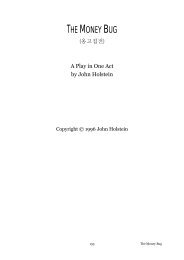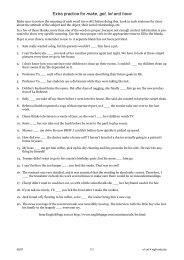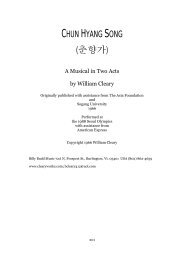concord noun number.pdf - Korea Mosaic
concord noun number.pdf - Korea Mosaic
concord noun number.pdf - Korea Mosaic
Create successful ePaper yourself
Turn your PDF publications into a flip-book with our unique Google optimized e-Paper software.
Concord: Noun Number<br />
NUMBER AGREEMENT IN SUBJECT AND RELATED NOUN<br />
Here’s a problem that we often encounter with two <strong>noun</strong>s that are related (usually by possession) to each<br />
other: When the subject is plural, how do we refer to the second <strong>noun</strong> when it’s logically only one In “From<br />
the Other Side of the Generation Gap,” we find sentences that use either singular or plural form for the second<br />
<strong>noun</strong>. (In the following sentences from that article, the subject has a single underline and the possessed<br />
element has double underline.)<br />
Singular second <strong>noun</strong><br />
. . . more than half the grandparents had seen a grandchild within the last week<br />
. . . the tendency in working-class families for young married couples to move near where the wife’s mother<br />
lives<br />
Plural second <strong>noun</strong><br />
Young women with children. . . expect their mothers to help them pick up the pieces.<br />
. . . the older women resented the numerous phone calls and visits from their grown daughters,<br />
. . . [grown daughters] often turned to their mothers for advice.<br />
In only 10 percent of American families do grandparents live with their children. . .<br />
. . . the reserachers found that [young husbands] encouraged closeness with their wives’ families.<br />
When we write: Should we say “daughter” or “daughters” in “Grandmothers often resent the impositions of<br />
their daughter(s) on their time”<br />
“Distributive Plural”<br />
from Practical English Usage, by Michael Swan (Oxford)<br />
507 singular and plural (8): distributive plural<br />
1. people doing the same thing<br />
To talk about several people each doing the same thing, English usually prefers a plural <strong>noun</strong> for<br />
the repeated idea.<br />
Tell the kids to bring raincoats to school tomorrow.<br />
(More natural than Tell the kids to bring a raincoat. . .)<br />
Plural forms are almost always used in this case with possessives.<br />
Tell the children to blow their noses. (NOT . . . to blow their nose.)<br />
Six people lost their lives in the accident.<br />
Uncountable <strong>noun</strong>s cannot of course be used in the plural.<br />
They were all anxious to increase their knowledge.<br />
(NOT... their knowledges.)<br />
For singular and plural forms after every, see 199.<br />
2. repeated events<br />
In descriptions of repeated single events, singular and plural <strong>noun</strong>s are both possible. When no<br />
details are given, plural <strong>noun</strong>s are more natural.<br />
I often get headaches. (NOT I often get a headache.)<br />
She sometimes goes for rides over the hills.<br />
When details of the time or situation are given, <strong>noun</strong>s are often singular.<br />
I often get a headache when I've been working on the computer.<br />
She often goes for a ride over the hills before supper.<br />
Singular <strong>noun</strong>s may also be used to avoid misunderstanding.<br />
I sometimes throw a stone into the river and wish for good luck.<br />
(NOT I sometimes throw stones. . . — only one stone is thrown each time.)<br />
To refer to the time of repeated events, both singular and plural expressions are often possible<br />
with little difference of meaning.<br />
We usually go and see my mother on Saturday(s).<br />
He's not at his best in the moming(s).<br />
3. generalisations and rules<br />
In generalisations and rules, singular and plural <strong>noun</strong>s are both possible.<br />
11/28/06 1/ 2 <strong>concord</strong> <strong>noun</strong> <strong>number</strong> rev.doc
We use a past participle in a perfect verb form.<br />
0R We use past participles in perfect verb forms.<br />
Mixtures of singular and plural are possible.<br />
Subjects agree with their verb.<br />
Children usually inherit some characteristics from their father and some from their<br />
mother.<br />
This often happens when fixed singular expressions like at the beginning are used.<br />
Discourse markers usually come at the beginning of sentences.<br />
11/28/06 2/ 2 <strong>concord</strong> <strong>noun</strong> <strong>number</strong> rev.doc


